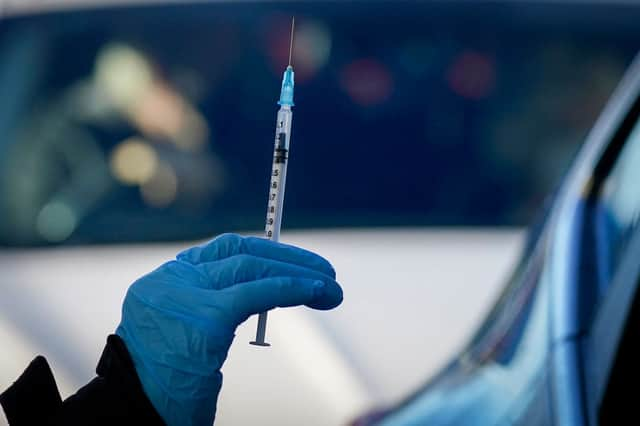Single dose of Pfizer Covid vaccine ‘highly protective’ after three weeks - how it compares to Oxford jab


A single dose of the Pfizer Covid-19 vaccine offers a high level of protection after three weeks, a new study has found.
Researchers at the University of Anglia (UEA) said that the vaccine was still effective after 21 days without a ‘top up’ second dose in the recommended time frame.
90% effective
Advertisement
Hide AdAdvertisement
Hide AdThe UEA study, which has not yet been peer-reviewed, assessed data from Israel where the Pfizer/BioNTech vaccine has been rolled out.
Scientists found that after 21 days the jab becomes 90 per cent effective in protecting against coronavirus, supporting the UK’s decision to delay the timing of administering the second dose.
It is not yet known how long immunity can last beyond 21 days without a second dose, but researchers believe it is “unlikely” to majorly decline during the following nine weeks.
However, the risk of infection doubled in the first eight days after the first dose of the Pfizer jab was given, with scientists citing people becoming less cautious as a possible cause.
Advertisement
Hide AdAdvertisement
Hide AdCoronavirus case numbers then declined to ‘low levels’ by day 21, at which point immunity had reached 90 per cent.
Lead researcher Professor Paul Hunter, from UEA’s Norwich Medical School, explained: “Surprisingly, the daily incidence of cases increased strongly after vaccination till about day eight – approximately doubling.
“We don’t know why there was this initial surge in infection risk but it may be related to people being less cautious about maintaining protective behaviours as soon as they have the injection.
“We found that the vaccine effectiveness was still pretty much zero until about 14 days after people were vaccinated. But then after day 14 immunity rose gradually day by day to about 90 per cent at day 21 and then didn’t improve any further.
Advertisement
Hide AdAdvertisement
Hide Ad“All the observed improvement was before any second injection. This shows that a single dose of vaccine is highly protective, although it can take up to 21 days to achieve this.
“And it supports the UK policy of extending the gap between doses by showing that a single dose can give a high level of protection.”
“Whilst we do not know how long this immunity will last beyond 21 days without a second booster, we are unlikely to see any major decline during the following nine weeks.”
How does this compare to the Oxford vaccine?
The findings come after a study by the University of Oxford found that its coronavirus vaccine with AstraZeneca has already begun to stop the virus from spreading.
Advertisement
Hide AdAdvertisement
Hide AdThe research found that a single dose of the Oxford vaccine offers protection of 76 per cent up to 12 weeks after a single dose, and may reduce transmission by 67 per cent.
This efficacy then rises to 82.4 per cent after the second dose is administered 12 weeks later.
The findings support the decision by the UK government to delay the timing of the second dose until 12 weeks after the first, with some raising concerns over the level of immunity from a single injection.
Before these results, little was known about how effective the coronavirus vaccines were at preventing transmission of the disease.
The results also indicate that those who have been vaccinated are not only protected from infection, but they are not likely to pass the virus on to anyone else.